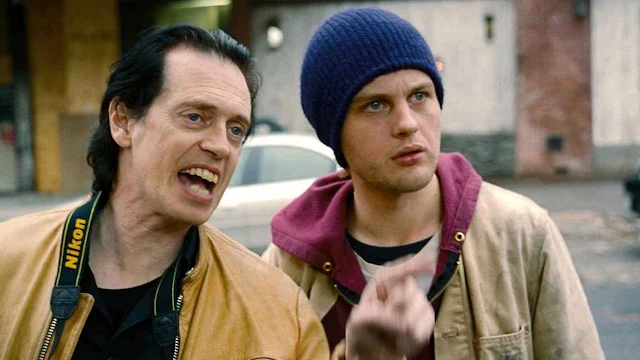 |
| Hanan Turk and Hani Salama in The Other |
Cast: Hanan Turk, Hani Salama, Nabil Ebeid, Mahmoud Hebeida, Lebleba, Hassan Abdel Hamid, Ezzat Abu Ouf, Amr Saad, Ahmad Wafiq, Edward Said, Hamdine Sabahi, Tamer Samir. Screenplay: Youssef Chahine, Khaled Youssef. Cinematography: Mohsen Nasr. Production design: Hamed Hemdan. Film editing: Rashida Abdel Salam. Music: Yehia El Mougy.
Youssef Chahine's The Other is a mess of a movie, but in a way the mess is its message. It begins with a symbol of unity: the United Nations building, where Adam (Hani Salama), a UCLA graduate student working on a thesis about religious terrorism, meets with a friend to prepare for their interview with Edward Said, the celebrated Palestinian-American literature professor at Columbia. During the interview, Said reiterates his concern about the way contemporary civilization is torn by disunity, by the tendency to treat one's opponents as "the other" instead of recognizing their common humanity. And so Chahine introduces his theme, which amounts to an exploration of such immense topics as global capitalism, cultural appropriation, and terrorism. Chahine tries to develop his theme through a love story: Adam falls in love at first sight of the pretty Hanane (Hanan Turk) waiting in an airport. She's a journalist out to interview a man who wants to build an interfaith retreat on his land in the Egyptian desert. Adam is on his way to visit his parents in Egypt, who just happen to be backing the project. So he facilitates the interview and wins Hanane's heart. Unfortunately, Adam's cynical and corrupt parents are only looking to make money off the project, acquiring the land and then selling it to a hotel company. Margaret, Adam's mother (Nabil Ebeid), is an American who married a wealthy Egyptian, Khalil (Mahmoud Hebeida), for his money. Her real -- and creepy -- love is for her handsome son, and naturally she is appalled when he marries Hanane, who comes from a lower class family. The complications ensuing from this familiar star-crossed lovers trope are perhaps enough for a romantic drama, but not to develop Chahine's larger theme, especially since he underscores the love story with a kind of "Ballad of Adam and Hanane" sung off-screen during key moments in their relationship. There's also an extended scene of dancing and singing at their wedding, partly to emphasize Margaret's distaste for the whole thing. And when Margaret causes a break between the couple, it stirs Adam, whom we have seen as smart and affectionate, to violence: He strikes Hanane and rapes her. The scene feels inconsistent with the characters, especially when Hanane, whom we have seen as tough and independent, forgives him. In short, The Other provides an object lesson on the danger of overreaching.








